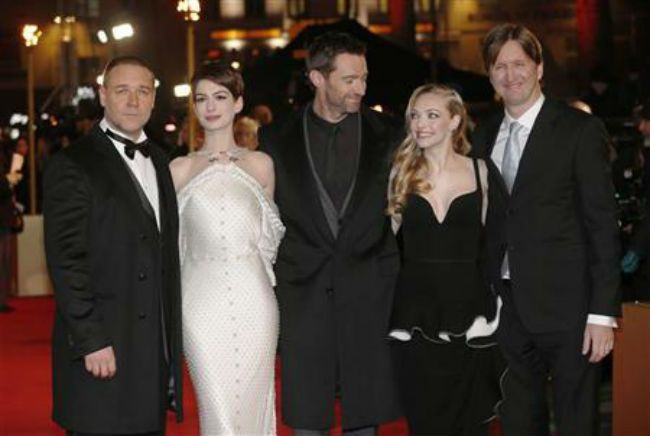
For British director Tom Hooper, the key to turning "Les Miserables" from the wildly popular stage musical to a cinematic experience both sweeping and intimate, was all in the close-up.
The stage musical has left audiences around the world wiping away tears with its themes of justice, redemption and romantic and familial love. So bringing it to life on screen for fans and filmgoers was "hugely daunting," Hooper says.
Still, the Oscar-winning director of "The King's Speech," was ambitious, wanting to offer even more of the "intense emotional experience" that has kept fans returning to various stage productions since "Les Miserables" made its English language debut 27 years ago.
"I felt very aware of the fact that so many millions of people hold this close to their hearts and would probably sit in the cinemas in complete fear," Hooper told reporters about his big screen take on the tale of French revolutionaries rising up against powerful forces.
Movie stars Hugh Jackman, Russell Crowe and Anne Hathaway were all put through an intense audition and rehearsal process, to make sure they could sing take after take, live, with cameras positioned right in their face.
It also features a large ensemble including Amanda Seyfried and Eddie Redmayne, as well as Sacha Baron Cohen and Helena Bonham Carter who lead the comic relief song, "Master of the House."
"I thought the great weapon in my arsenal was the close up, because the one thing on stage that you can't enjoy is the detail of what is going on in people's faces as they are singing," Hooper said. "I felt (that) having to do a meditation on the human face was by far the best way to bring out the emotion of the songs."
That tactic may or may not have paid off for a movie that is seen as one of the front runners for Oscar awards in February. Early screenings of the film that opens on Christmas Day have moved some audiences. Critics have praised the performances, but given the movie as a whole less than top marks.
The movie reunites the same team that worked on the original musical, including French composer Claude-Michel Schonberg, lyricist Alain Boublil, and English language adapter Herbert Kretzmer. It adds one original song to the existing show, which includes the well-known "I Dreamed a Dream".
Jackman plays petty thief Jean Valjean, the protagonist of the story based on French writer Victor Hugo's epic 1862 historical novel "Les Miserables." Valjean transforms himself into a respected businessman but struggles for decades to escape the clutches of his nemesis, police inspector Javert (Russell Crowe), and along the way encounters factory worker Fantine (Anne Hathaway).
TIMELY MESSAGE
Inspired by films such as 1991's "The Commitments," singing was filmed live rather than later recorded in a studio to give the movie a more authentic feel.
Hathaway lost 25 pounds (11.3 kg) for the role and cut her long brown hair. She spent six months perfecting the task of crying and singing at the same time for "I Dreamed a Dream" and is a hot favorite for a best supporting actress Oscar.
In a twist of fate, Hooper had initially seen Hathaway singing to Jackman a boisterous version of the "Les Miserables" song "On My Own" at the 2011 Academy Awards ceremony, just when he was trying to decide whether to direct the film and was thinking about casting.
"I was sitting there, going: 'There is something very strange happening'," he joked. "Whatever happened, it certainly worked, because I ended up casting both of them."
Hooper said he took his inspiration mostly from Hugo's novel rather than any one stage production, and thus saw Crowe's Javert more as a "deeply honorable" character than a simplistic "bad guy" as portrayed in some productions.
The time also felt right, he said, to bring the story to a larger audience on the big screen.
"There are so many people hurting around the world because of social, economic, inequality and inequity. There is such anger against the system," he said, "whether it's the protests on Wall Street or in London at St Paul's, or the seismic shifts happening in the Middle East."
"'Les Miserables' is the great advocate of the dispossessed," Hooper said. "It teaches you the way to collective action is through passionate engagement with the people around you. It starts with love for the person next to you."
© Thomson Reuters.




